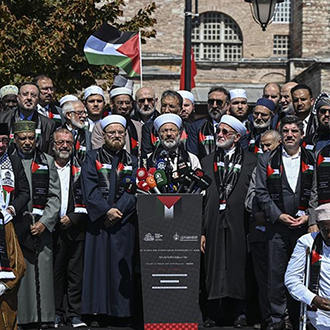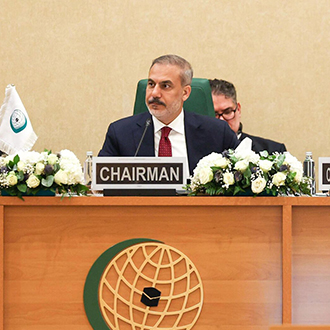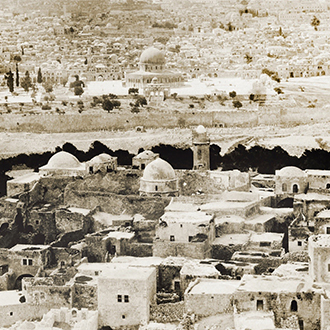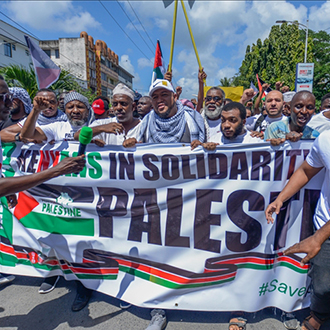Along with Abu Jahl, ‘Umar ibn al-Khattab stood out as one of the most hostile people to the Prophet and the Muslims in Mecca. He was literate, interested in the foreign affairs of Mecca, and had a very harsh temperament. While the Messenger of Allah was striving to ensure that some influential people from outside the Banu Hashim accepted Islam, he was continually supplicating to Allah by praying, “O Lord! Strengthen Islam with ‘Umar ibn al-Khattab or Abu al-Hakam ‘Amr ibn al-Hisham (Abu Jahl).” (Ibn Sa’d, Tabaqat, 3/247; Tirmidhi, Manaqib, 18) In answer to his prayers, ‘Umar ibn al-Khattab embraced Islam in the same year.
In fact, Umar told the story of how he became a Muslim to those who were surprised by his decision: “One night I went out for a drink, and when I could not find a place to drink and no one to accompany me, I decided to go to the Ka‘bah and perform circumambulation. When I arrived at the Ka‘bah, I saw Muhammad praying, so I walked slowly under the cover of the Ka‘bah to listen to what he recited in prayer so as not to be seen by him. He did not notice me so I began to listen to what he was reciting in prayer (Surah al-Haqqah). When I thought, ‘What he is reciting are the words of a poet, as the Quraysh say’, the Prophet recited the Qur’anic verses, “It is not the prose of a poet (as you claim), (yet) you hardly have any faith. Nor is it the mumbling of a fortune-teller, (yet) you are hardly mindful.” (Haqqah, 69:41-42). So, then I thought, ‘If this is not the word of a fortune-teller or a poet, then it is Muhammad’s own invention.’ At that point the Prophet recited, “Had the Messenger made up something in Our Name, We would have certainly seized him by his right hand, then severed his aorta, and none of you could have shielded him (from Us)!” (Haqqah, 69:44-47). Everything I thought was answered and my heart softened. I felt satisfied, and my eyes filled with tears. The verses of the Qur’an helped me embrace Islam. Finally, Muhammad finished his prayer and started to walk towards his house. I walked behind him. In the street in front of his house, he noticed me and recognized me. He said, ‘What is it, O ‘Umar?’ I said, ‘I have come to believe in Allah and His Messenger and what he has conveyed.’ He approached me, put his hand on my heart, and prayed. Then the Prophet said, “Allah has granted you guidance, O Umar!” (Ibn Hisham, al-Sirat al-Nabawiyyah, 1/374) and went home.
The same night that ‘Umar became a Muslim, he went straight to the house of Abu Jahl and told him that he had accepted Islam. His acceptance of Islam made the Prophet (saw) very pleased but the polytheists were shocked and stunned. It was such a shock to them that they could not even utter a word when the Messenger of Allah performed congregational prayer with the Muslims in the Ka‘bah for the first time.
Oppression and boycott by the Quraysh
The fact that the emigrants who went to Abyssinia were living there in safety, that Najashi did not extradite them but protected them, that the number of Muslims was gradually increasing, and that important figures such as Hamza ibn ‘Abd al-Muttalib and ‘Umar ibn al-Khattab embraced Islam, worried the Meccan polytheists very much. In response, the Meccan polytheists sought preventive measures and eventually settled on a drastic plan – the assassination of Prophet Muhammad. They declared the Banu Hashim enemies and agreed amongst themselves not to trade with them, live with them, or talk to them until he was killed or handed over to them. They regarded the spread of Islam, which promised peace to all humanity, as the spread of an epidemic and took measures to keep it away from themselves. Moreover, they announced this boycott decision, which had social and economic aspects, by hanging it up on the wall of the Ka‘bah. Thus, instead of expelling the Muslims from the city, they decided to keep them under their control by making their living conditions as difficult as possible.
As soon as Abu Talib, the Prophet’s uncle, heard about the decision taken against them, he called a meeting of the Banu Hashim tribe, of which he was the leader. He informed them about the decision of the polytheists. Even though not all the members of the tribe believed in the religion that the Prophet Muhammad was trying to spread, the decision from the meeting concluded with all agreeing to uphold the honor of the tribe and to protect the Prophet with all their strength. This is because, in the Arab tradition, failure to protect a member of the tribe who was attacked by an outsider was a disgrace to the honor of the whole tribe. Immediately after the decision was taken, Abu Talib moved his nephew and the members of his tribe to his own neighborhood to ensure their safety.
For three years (616- 619) the Banu Hashim lived under a social and economic blockade in the neighborhood of Abu Talib. Many merchants, especially Prophet Muhammad, Khadijah, and Abu Talib, risked their wealth. In the course of time, they exhausted all their wealth because they could not engage in caravan trade. Only during the pilgrimage season, during the sacred months, did they go out of the neighborhood and try to supply their needs. However, the polytheists, especially Abu Jahl and Abu Lahab, threatened the merchants to not sell them goods or to sell them at very high prices. Thus, the Banu Hashim tribe could not buy enough provisions, and their supplies began to rapidly deplete.
When the severity and negative effects of the embargo on Banu Hashim intensified, some people came together to try to end it. Some of them were relatives of the Banu Hashim. For example, Zuhayr ibn Abu Umayya and ‘Hisham ibn ‘Amr were among them. One day, these two people went to the elders of Quraysh and convinced them that the boycott decision, which had been taken under the pressure of Abu Jahl, should be opposed and that the agreement hanging on the wall of the Ka‘bah should be torn down.
The next day, the others, except Zuhayr, went to the Ka‘bah and sat there with the Quraysh. While they were still there, Zuhayr came, circumambulated the Ka‘bah, and without sitting with them, he pointed to the agreement hanging on the wall of the Ka‘bah and shouted loudly, “O Quraysh, know that I will not sit with you again until this cruel agreement is torn down.” Abu Jahl replied with equal vehemence that it would never be torn. However, when Zuhayr’s companions, with whom he had made an agreement, unanimously supported him, Abu Jahl, fearing that the disagreement that had arisen would become worse, kept silent. Mut‘im ibn ‘Adi got up and tore up the page of the agreement. They all went to the neighborhood of Abu Talib, explained what they had done, and brought the members of Banu Hashim out of the neighborhood where they had been confined. Thus, the boycott ended.
Throughout the three[1]year embargo, both the Prophet and all members of his tribe, regardless of their acceptance of Islam, endured unprecedented pain and loss. Amidst this challenging period, a sense of unity and solidarity flourished among those who sought refuge in the neighborhood of Abu Talib, while the polytheists grappled with internal divisions driven by tribalism. Even though they suffered from hunger and disease, those who believed in the Prophet never blamed him for what happened to them. In fact, many people communicated with the Muslims and accepted Islam as their religion. Ultimately, the polytheists could not achieve their goal with the boycott decision.
Two major losses: the demise of his uncle Abu Talib and his wife Khadijah
Sometime after the end of the embargo on his tribe, Banu Hashim, the Prophet lost his uncle Abu Talib, who had loved him dearly and had always protected him.
After the passing of Abu Talib, Abu Lahab assumed the leadership of the Banu Hashim tribe. Meanwhile, the Prophet’s aunts went to Abu Lahab and told him that Muhammad was also his nephew and that he was now without protection. They stressed to Abu Lahab that Muhammad was the most appropriate person to protect. As a result, Abu Lahab decided to protect the Prophet even though he did not agree with the opinion of his sisters. In fact, he explained that he made this decision only to ensure unity and solidarity within the tribe. However, after a while, he openly reneged on this commitment.
While the Prophet Muhammad was still mourning his uncle, he lost his wife Khadijah (10 Ramadan 620). Khadijah, who never withheld her support throughout their marriage, was the first to recognize his prophethood and spent all her wealth on the cause of Islam. She gave him strength when everyone turned away from him. The Prophet buried her in the Hajun cemetery in Mecca. The Messenger of Allah, who visited her grave many times, always told the people around him about the good deeds of his wife and always remembered her with goodness.
In the Prophet’s own words, the year 620 was named “Am al-Huzn”—the Year of Sorrow—reflecting the profound grief he endured during that time.









